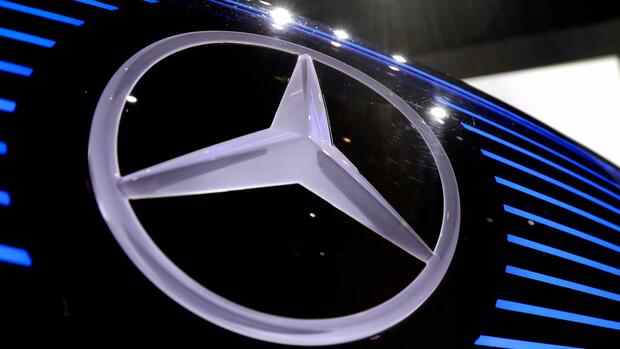Mercedes-Benz builds cars for the Chinese market with BAIC.
(Photo: picture alliance / ASSOCIATED PRESS)
Munich What Lower Saxony is to Volkswagen, China is now to Daimler: a core shareholder without whom nothing works. Because two shareholders from the Far East now each hold almost ten percent of the voting rights in the Mercedes manufacturer. On Monday, the Beijing Automotive Group (BAIC) announced that it had held a total of 9.98 percent of the shares in Daimler since 2019, not just the already known five percent. BAIC is the Chinese production partner of the Swabians.
The background: As a result of the spin-off of the Daimler truck business and the division’s stock market debut last Friday, BAIC had to disclose its circumstances. It is now clear: the Beijing state-owned company is Daimler’s largest single shareholder. Until now, Li Shufu, the founder of the Chinese auto company Geely, was the most important owner with a share of the voting rights of 9.7 percent.
“One fifth of Daimler is in Chinese hands,” says Marc Tüngler, General Manager of the German Association for Protection of Securities Holdings (DSW). BAIC manifests its power in the Dax group and underlines the increased interest in the Mercedes-Benz car business. Tüngler is irritated by the timing of the disclosure of the BAIC stake and now hopes that Daimler has not initiated a “wave of changes” in its shareholder structure with the truck spin-off.
Internally, assumptions about a Chinese takeover in Stuttgart are rejected. “This thesis is just nonsense,” said a high-ranking Daimler manager. Especially since BAIC is planning “no further increase” in its stake in Daimler according to the agreement. Li Shufu shouldn’t have any plans to increase either.
Top jobs of the day
Find the best jobs now and
be notified by email.
The reason: As soon as one of the two would step up, the financial supervisory authority Bafin would come into play immediately, which has to intensively examine all holdings of more than ten percent in domestic banks. With Mercedes-Benz Bank, Daimler has an institute in its portfolio that has a full banking license.
Daimler boss Ola Källenius welcomed the disclosure of the increased BAIC share. “We are pleased about the commitment of all long-term oriented shareholders who support our strategy”. For almost 20 years, the Stuttgart-based company has been building and selling highly successful Mercedes vehicles together with BAIC in the Far East through the Beijing Benz Automotive (BBAC) joint venture. In the past decade alone, sales of cars from the brand with the three-pointed star in China have more than tripled – to over 700,000 vehicles per year.
Daimler Truck starts with a valuation of 23 billion euros in the Dax
China has long since become Daimler’s most important sales market. The Swabians make over a third of all sales in the Communist People’s Republic. And presumably more than half of Daimler’s profits come from China. The Stuttgart-based company has a cross-shareholding with BAIC and holds 9.55 percent of the shares in BAIC Motor, the group’s car subsidiary.
Daimler wants to take over majority in joint venture
Just like BMW, Daimler is now also aiming to take over the majority in its Chinese joint venture. “We are working intensively on this,” it says from corporate circles. A solution is getting closer. With the friendly reaction of Daimler CEO Källenius to the stronger commitment of BAIC in Stuttgart, the Swabians would now pave the way to secure more than 50 percent of the shares in the joint venture BBAC in the future, explains an insider.
If so, Daimler could finally fully consolidate the joint venture on its balance sheet. Sales and profits would shoot up sharply. For this, however, further, long-term commitments for local models and investments seem necessary in China.
They are ready for it in Stuttgart. For example, the Swabians are planning to build a series exclusively for China in China for the first time with the EQE SUS from 2024. For this, the Swabians want to cross the two most important body shapes – sedan and SUV. The result is a sport utility sedan, a fully electric giant sedan of the luxury class.
More: “We can’t wait a second”: Daimler boss Källenius wants to push Mercedes conversion after truck spin-off
